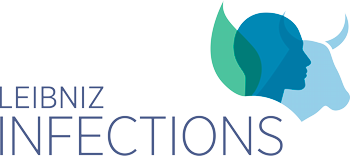The new Leibniz Lab "Pandemic Preparedness: One Health, One Future" links excellent inter- and transdisciplinary research from 41 Leibniz institutes. For the first time in Germany, pathogen-oriented sciences (virology, bacteriology, mycology and immunology) are collaborating with other life sciences such as ecology, health technologies, health economics and educational research. This new instrument of the Leibniz Association will be funded for three years with three million euro. The aim of the Leibniz Lab is to pool research in these areas in order to prepare, to prevent and to respond better to future pandemics and to make the knowledge gained available to policymakers in the form of evidence-based recommendations for action.
The Research Center Borstel, Leibniz Lung Center, together with the Leibniz Institute of Virology and the other partners, is pleased to announce the approval of the Leibniz Lab Pandemic Preparedness. This is a truly trans- and interdisciplinary project that focuses on comprehensive preparation for future pandemics, also based on what the corona pandemic has taught us. The FZB is involved in two focus areas: environmental-animal-human interphase (Prof. Ulrich Schaible) and physiological and psychological disease stress (Prof. Susanne Krauss-Etschmann).
"In the Leibniz Lab, we will bring together the unique expertise of the Leibniz institutes in Germany in respiratory pathogen research (viruses, bacteria and fungi) and their impact on the acute course of the disease as well as their possible long-term consequences. Linking knowledge in these inter- and transdisciplinary research fields was long overdue, considering that most pandemics in the past were caused by respiratory pathogens, especially influenza viruses," says Prof. Dr. Gülşah Gabriel, Head of the Department of Viral Zoonoses – One Health at the Leibniz Institute of Virology (LIV) and spokesperson for the Leibniz Lab "Pandemic Preparedness: One Health, One Future".
"Future pandemics must not lead to children and adolescents again developing major learning deficits and showing frequent psycho-somatic abnormalities. The work of educational and spatial research within the framework of the Leibniz Lab should therefore generate knowledge on how the educational, care and upbringing mission of educational institutions can be maintained in the best possible way during pandemics," says Prof. Dr. Olaf Köller, Scientific Director of the Leibniz Institute for Science and Mathematics Education (IPN) in Kiel and co-spokesperson of the Leibniz Lab.
"Pandemics are a global challenge: neither their prevention nor an efficient response to future pandemics can succeed if countries act in isolation," explains Dr. Michael Stolpe, Head of the Global Health Economy Research Center at the Kiel Institute for the World Economy and co-spokesperson of the Leibniz Lab, and continues: "In the new Leibniz Lab, we want to learn how to increase the resilience of our healthcare system and make the best use of scarce medical resources to save lives during a pandemic, and also develop proposals for greater international cooperation both in preparation for and in response to future pandemics."
Contact:
Prof. Dr. Gülşah Gabriel
Leibniz-Institut für Virologie, Hamburg
Stiftung Tierärztliche Hochschule Hannover
Further Informationen: Leibniz-Gemeinschaft: Leibniz-Labs
Press Release of the Leibniz-Associations on the Leibniz Labs: Leibniz-Gemeinschaft: Förderung für Leibniz-Labs und WissenschaftsCampi

